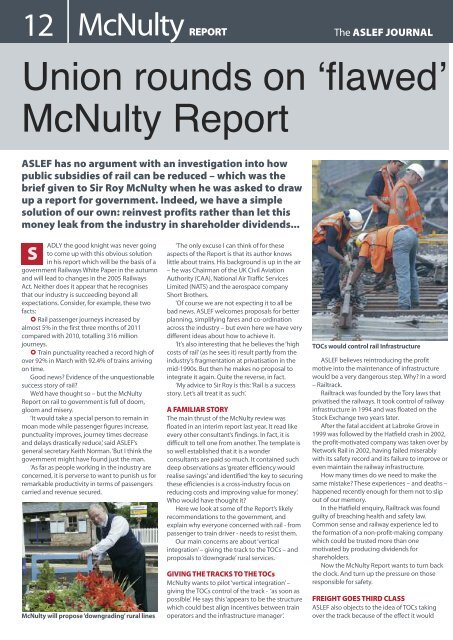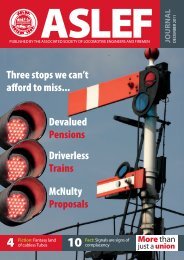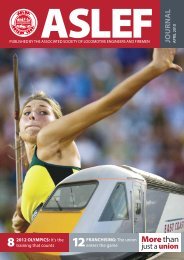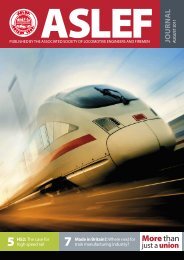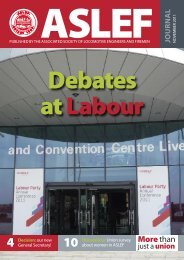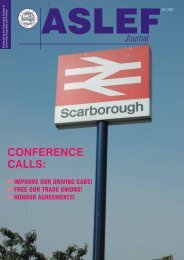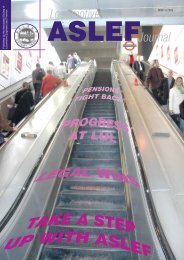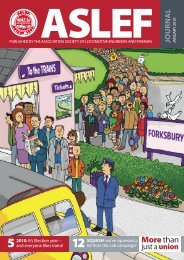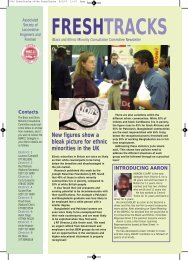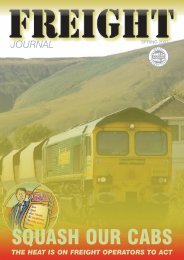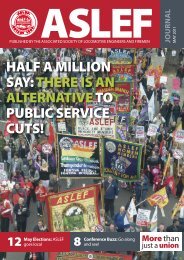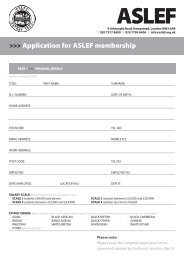You also want an ePaper? Increase the reach of your titles
YUMPU automatically turns print PDFs into web optimized ePapers that Google loves.
12 mcNulty REPORT<br />
the ASLEF JOURNAL<br />
Union rounds on ‘flawed’<br />
McNulty Report<br />
ASLEF has no argument with an investigation into how<br />
public subsidies of rail can be reduced – which was the<br />
brief given to Sir Roy McNulty when he was asked to draw<br />
up a report for government. Indeed, we have a simple<br />
solution of our own: reinvest profits rather than let this<br />
money leak from the industry in shareholder dividends...<br />
S<br />
AdLy the good knight was never going<br />
to come up with this obvious solution<br />
in his report which will be the basis of a<br />
government railways White Paper in the autumn<br />
and will lead to changes in the 2005 railways<br />
Act. Neither does it appear that he recognises<br />
that our industry is succeeding beyond all<br />
expectations. consider, for example, these two<br />
facts:<br />
rail passenger journeys increased by<br />
almost 5% in the first three months of 2011<br />
compared with 2010, totalling 316 million<br />
journeys.<br />
train punctuality reached a record high of<br />
over 92% in march with 92.4% of trains arriving<br />
on time.<br />
good news Evidence of the unquestionable<br />
success story of rail<br />
We’d have thought so – but the mcNulty<br />
report on rail to government is full of doom,<br />
gloom and misery.<br />
‘it would take a special person to remain in<br />
moan mode while passenger figures increase,<br />
punctuality improves, journey times decrease<br />
and delays drastically reduce,’ said AsLEf’s<br />
general secretary Keith Norman. ‘but i think the<br />
government might have found just the man.<br />
‘As far as people working in the industry are<br />
concerned, it is perverse to want to punish us for<br />
remarkable productivity in terms of passengers<br />
carried and revenue secured.<br />
McNulty will propose ‘downgrading’ rural lines<br />
‘the only excuse i can think of for these<br />
aspects of the report is that its author knows<br />
little about trains. his background is up in the air<br />
– he was chairman of the UK civil Aviation<br />
Authority (cAA), National Air traffic services<br />
Limited (NAts) and the aerospace company<br />
short brothers.<br />
‘of course we are not expecting it to all be<br />
bad news. AsLEf welcomes proposals for better<br />
planning, simplifying fares and co-ordination<br />
across the industry – but even here we have very<br />
different ideas about how to achieve it.<br />
‘it’s also interesting that he believes the ‘high<br />
costs of rail’ (as he sees it) result partly from the<br />
industry’s fragmentation at privatisation in the<br />
mid-1990s. but then he makes no proposal to<br />
integrate it again. Quite the reverse, in fact.<br />
‘my advice to sir roy is this: ‘rail is a success<br />
story. Let’s all treat it as such’.<br />
A FAMILIAR STORY<br />
the main thrust of the mcNulty review was<br />
floated in an interim report last year. it read like<br />
every other consultant’s findings. in fact, it is<br />
difficult to tell one from another. the template is<br />
so well established that it is a wonder<br />
consultants are paid so much. it contained such<br />
deep observations as ‘greater efficiency would<br />
realise savings’ and identified ‘the key to securing<br />
these efficiencies is a cross-industry focus on<br />
reducing costs and improving value for money’.<br />
Who would have thought it<br />
here we look at some of the report’s likely<br />
recommendations to the government, and<br />
explain why everyone concerned with rail - from<br />
passenger to train driver - needs to resist them.<br />
our main concerns are about ‘vertical<br />
integration’ – giving the track to the tocs – and<br />
proposals to ‘downgrade’ rural services.<br />
GIVING THE TRACKS TO THE TOCs<br />
mcNulty wants to pilot ‘vertical integration’ –<br />
giving the tocs control of the track - ‘as soon as<br />
possible’. he says this ‘appears to be the structure<br />
which could best align incentives between train<br />
operators and the infrastructure manager’.<br />
TOCs would control rail Infrastructure<br />
AsLEf believes reintroducing the profit<br />
motive into the maintenance of infrastructure<br />
would be a very dangerous step. Why in a word<br />
– railtrack.<br />
railtrack was founded by the tory laws that<br />
privatised the railways. it took control of railway<br />
infrastructure in 1994 and was floated on the<br />
stock Exchange two years later.<br />
After the fatal accident at Labroke grove in<br />
1999 was followed by the hatfield crash in 2002,<br />
the profit-motivated company was taken over by<br />
Network rail in 2002, having failed miserably<br />
with its safety record and its failure to improve or<br />
even maintain the railway infrastructure.<br />
how many times do we need to make the<br />
same mistake these experiences – and deaths –<br />
happened recently enough for them not to slip<br />
out of our memory.<br />
in the hatfield enquiry, railtrack was found<br />
guilty of breaching health and safety law.<br />
common sense and railway experience led to<br />
the formation of a non-profit-making company<br />
which could be trusted more than one<br />
motivated by producing dividends for<br />
shareholders.<br />
Now the mcNulty report wants to turn back<br />
the clock. And turn up the pressure on those<br />
responsible for safety.<br />
FREIGHT GOES THIRD CLASS<br />
AsLEf also objects to the idea of tocs taking<br />
over the track because of the effect it would


